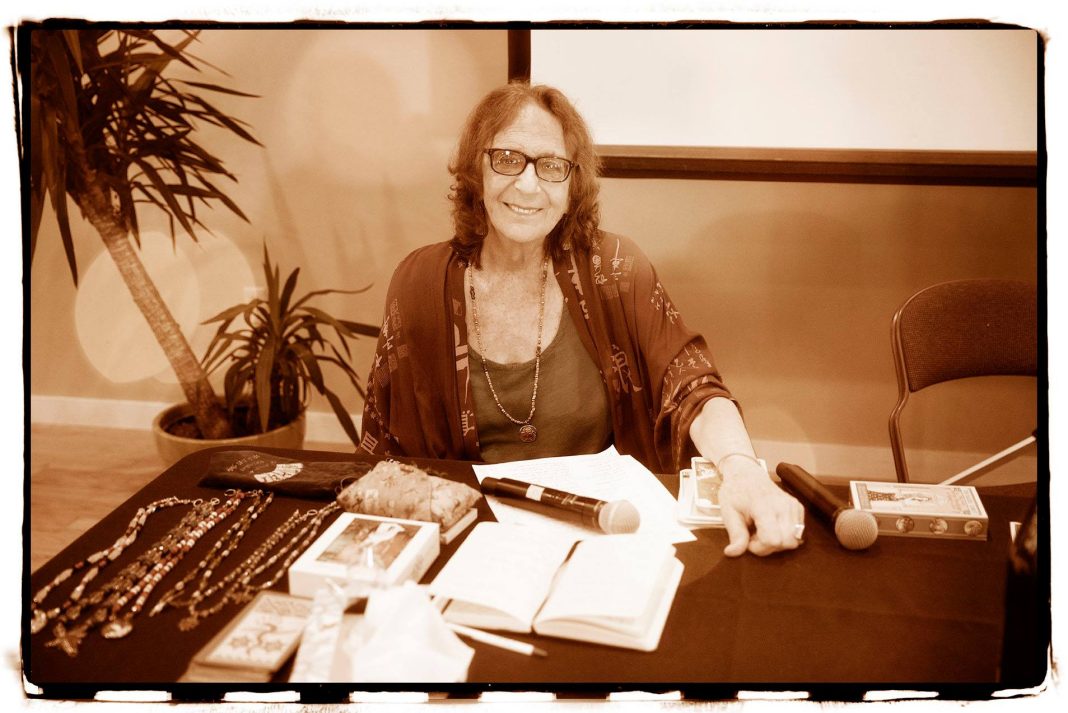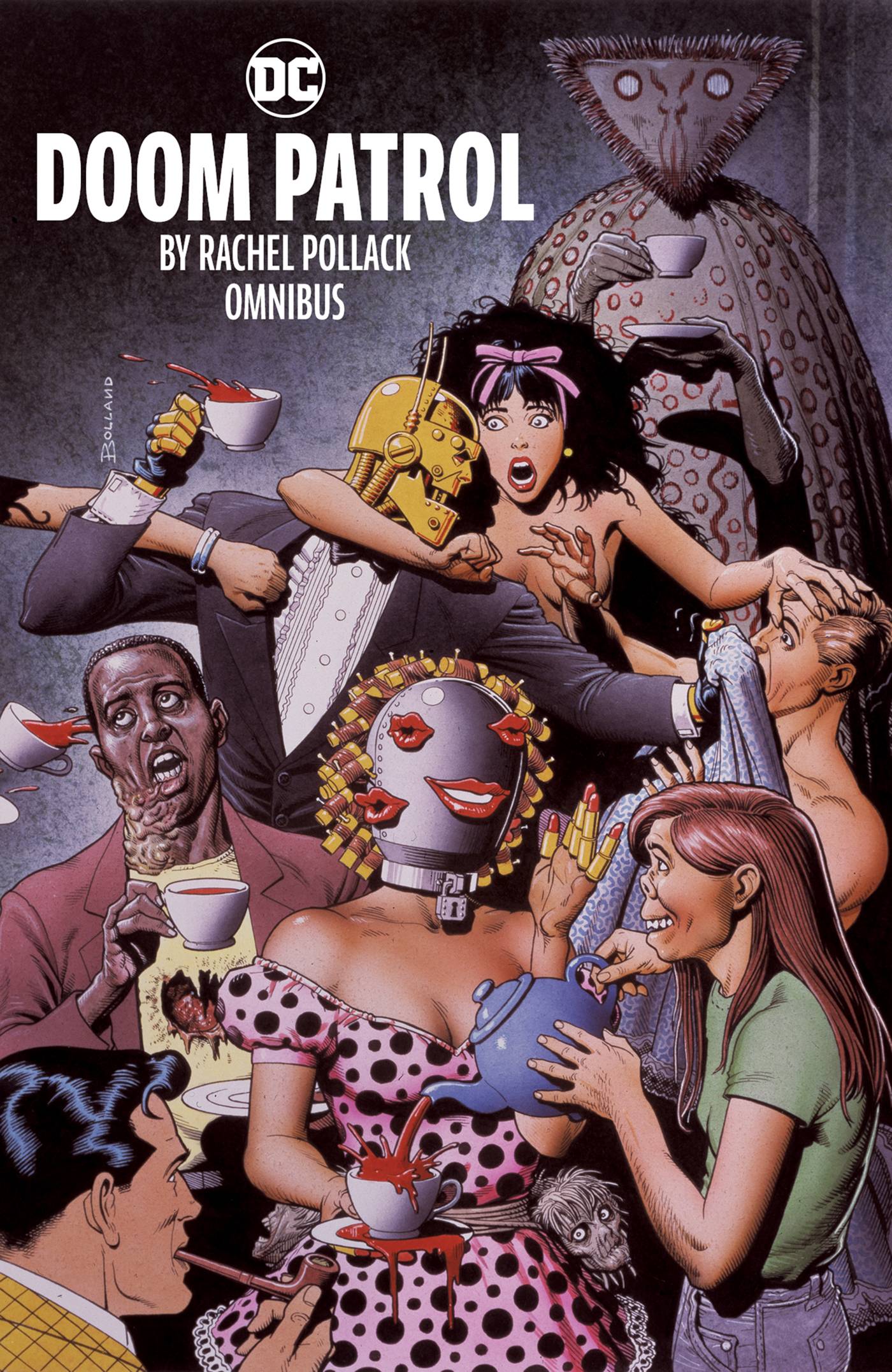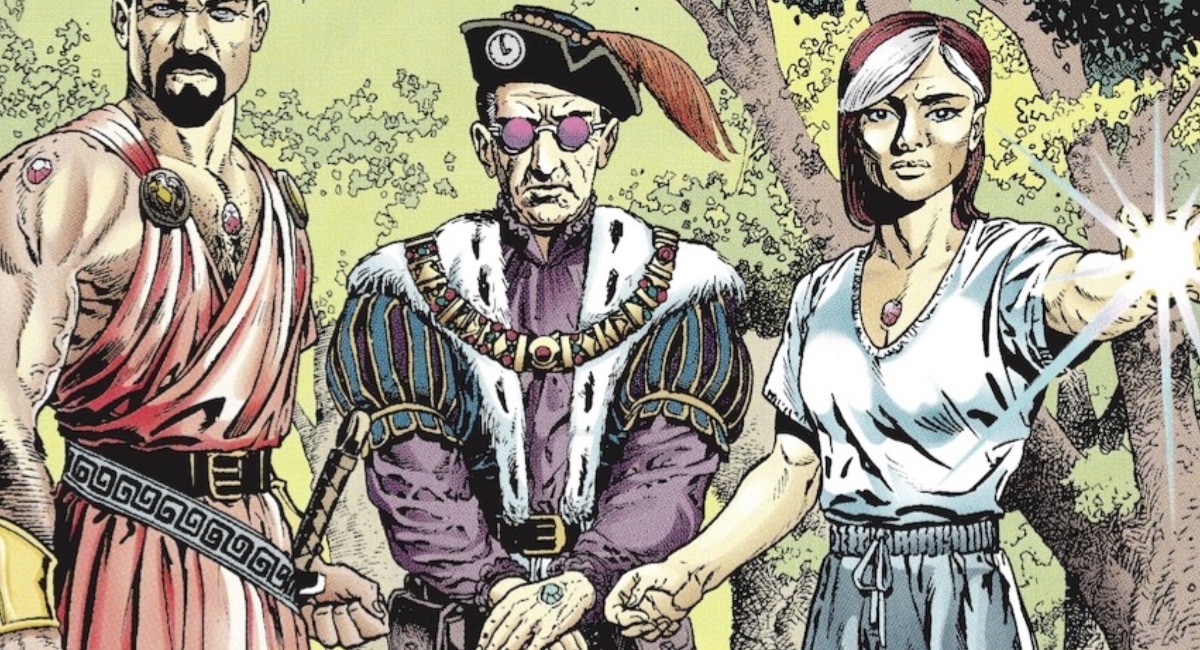Rachel Pollack has finally transcended to another plane of existence at the age of 77, according to a public Facebook post from her wife, Zoe Matoff. A Tarot, science fiction, and trans icon, Pollack is widely known as a comic book writer for her Doom Patrol run from 1993 to 1995, where she introduced the first openly transgender mainstream superhero, Kate Godwin/Coagula (named after trans writer Kate Bornstein and Transy House founder Chelsea Goodwin), a lesbian sex worker who gains powers after having sex with a super-powered client. Pollack was diagnosed with Hodgkin’s Lymphoma in July 2022, and in March 2023, her good friend Neil Gaiman announced that she’d been moved to a hospice facility.
Matoff posted on Facebook on April 7, 2023, “I am sad to tell you that our beloved Rachel Pollack passed so peacefully and beautifully today at about 12:45 p.m. after a touching ceremony called Hand to Heart. Several of us stood in a circle. I had my hand on her heart. I began the circle by saying how much I love her and what she means to me. Each took their turn after me sharing their own feelings and appreciation of Rachel. I know that Rachel will continue to be a Light in this world and in the next. She will continue to inspire so many of our beloved Tarot community, the Science Fiction and Fantasy community, the Comics community, and the Transgender community for whom she shared so much respect and care. We have felt and cherished your love and prayers over the past months and years as Rachel experienced so many health challenges. We are One.”
Rachel Pollack’s Body Politics
Born to a Jewish family on August 17, 1945, in Brooklyn, NY, Pollack attended New York University, graduating with an English degree, before earning a master’s degree in English from Claremont Graduate University in California. Upon graduating, she began her career as a teacher at a state university in Plattsburgh, NY, where, at 26, she was introduced by a colleague to the world of Tarot, which came to define her life.
“There was a teacher who would wait an hour or more for a ride, even though she was only a five or ten minute walk from the school,” Pollack told Celebrating Tarot. “She offered to read my tarot cards if I would give her a ride home. I only knew of the tarot from T.S. Eliot’s poem, The Wasteland, so I was very excited about it. What I liked was the combination of words and pictures, and the fact that she could look things up in a book to find meanings.”
During her period at SUNY Plattsburgh, Pollack also published her first short story, “Pandora’a Bust,” in the science fiction magazine New Worlds Quarterly, in which she revealed that she was a trans lesbian named Rachel. “[A]lmost the instant I allowed myself to ask that, the answer came like a kind of revelation,” Pollack later reflected in an autobiographical essay, “Trans Central Station,” published in her 2018 anthology The Beatrix Gates. “I did not want to be a woman. I already was.”
Pollack used her experience as a trans woman to inform her comics, having worked on DC’s The New Gods, issues #1-11, DC’s Time Breakers, DC’s Tomahawk, and most recently, ComiXology Original’s The Never Ending Party, which was the creator’s first comic book project in 25 years. However, among fans today, especially queer, trans fans like myself, the creator is best known for her first-ever comics project, DC’s Doom Patrol, issues #64-87, because that book changed the course of history, giving trans folx a voice in mainstream big two comics for the first time. And Coagula was a badarse trans lesbian sex worker, a character archetype that would make an unlikely debut today.
“I came up with this wild idea—my ideas are often very daring, particularly around sexuality, usually in a comical way,” Pollack told The Nib cartoonist Annie Mok in 2019 about coming up with the idea to create Coagula. “I decided to do this transsexual lesbian character. It was basically like, my friends, you know?”
Pollack continued, “[Coagula] came to represent the struggle over people’s bodies. People’s shame, fear, over ridiculing them. […] Kate was the person who had it together, who had gone through that, dealt with it, so she was able to help the others.”
Even in areas of Pollack’s life other than comics, she refused to lend superiority to the opinions of cisgender people about trans bodies. In the 1970s, when she got involved with the UK Gay Liberation Front, a group demanding “absolute freedom for all,” except Along with trans poet-writer-activist Roz Kaveny (More Tales from the Forbidden Planet), Pollack formed the GLF’s Transvestite, Transsexual and Drag Queen group. In January 1972, the group collectively penned a piece about transphobia and the trans experience in issue #11, the “Lesbian Issue,” of GLF’s Come Together newsletter.
“Certainly one thing becomes more and more clear as we come together; pass or not pass, we can’t let anybody tell us what we are,” the article concluded.
Transgender Magic, Tarot and Kabbalah
Pollack is also a prolific author of over 40 science fiction and fantasy novels, non-fiction works, and comics. Her work has been widely praised for its depth, insight, and imagination. In 1997, she won the World Fantasy Award for Best Novel for the novel that was my first introduction to her work, Godmother Night (in my opinion, this book is at the top of the list of prose novels that you must read if you enjoy the creator’s comic book work). Additionally, she won the Arthur C. Clarke Award for Unquenchable Fire — which trans author Charlie Jane Anders has hailed as “a breathtaking work of incredible strangeness” — and was nominated for a Nebula Award for Temporal Agency.
In addition to her work in genre, Pollack was one of the foremost authorities on the Tarot, having authored several books on the subject that are now taught at universities across the world, including 78 Degrees of Wisdom: A Book of Tarot, Part I and II and The New Tarot Handbook. Since 1980, when the first edition of the first volume of 78 Degrees came out, she became recognized as an authority on Tarot and began teaching workshops on it. Her contributions to the field helped expand its reach and popularity, making it more accessible to people from all walks of life.
As Pollack grew older, she began to study the Tarot more seriously, reading books and practicing readings for friends and family. She also explored various spiritual traditions, including Buddhism, Hinduism, and Kabbalah, to deepen her understanding of the Tarot and its meanings.
Through Pollack’s exploration of Kabbalah, the Brooklyn-born Jewish author gained a deeper understanding of the interconnectedness of all things. This helped her see the Tarot as a tool for exploring the complex web of relationships and energies that make up our world. She also learned about the mystical dimensions of the Hebrew alphabet, which helped her to see connections between the letters of the alphabet and the symbols of the Tarot. Pollack explored these concepts in The Kabbalah Tree: A Journey of Balance & Growth, an amazing book on how Tree of Life symbolism is embedded in the ten Sephiroth of Jewish Kabbalah and the Tarot.
Neil Gaiman met Pollack in 1985 while interviewing her for the now-defunct Today newspaper. He told The Guardian that the creator’s Judaism was always important to her, but she fought the religion’s sexist and transphobic elements. “Rachel and I bonded over many, many things, one of which was Jewishness, and despite being a bastion of the new age she was also incredibly Jewish. There’s an orthodox prayer that begins ‘Thank you, G-d, for not making me a woman,'” Gaiman recalled.
“I remember her telling me that after she came to following her surgery, she said, ‘Blessed to you G-d for not making me a woman, but thrice-blessed to the doctor who did.'”
Rachel Pollack: A National & Personal Treasure
With all these successes, one can see why Cat Fitzpatrick once called Pollack a “national treasure.”
Today, others are still trying to dictate “what we are,” with increasingly contradictory messages from oppressive institutional and interpersonal power systems that try to mark trans bodies as inferior. Although, in a 2022 Pew Research Center study, most people said they favored protecting trans people from discrimination, 60 percent of respondents also said they favor policies requiring trans athletes to compete on teams that match their sex at birth, showing a disparity between what Americans stated beliefs and the policies they support.
Yes. Reading these statistics makes me feel hopeless until I think about trailblazers before me. Luckily, for future generations of trans creators, Pollack’s work is there as a roadmap. It demonstrates how to engage in body politics through art and activism without losing themselves to the trauma of the battle.
Coagula is immortal, so Pollack is immortal. To me, the character represents Pollack’s ideals and strength in the face of gender discrimination. She is a role model for people dealing emotionally with the current struggle in the United States over how the government can control our bodies. Thanks to biases engrained due to centuries of oppression, trans and queer people have limited institutional power. This is defined by policymakers’ ever-changing definitions of who we are—who we are to them, anyway.
Pollack was a trailblazer.








